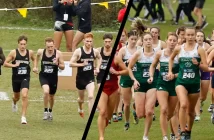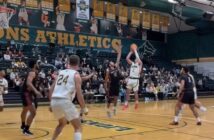By Anthony Martinez, Sports Editor
Free speech within sports has been around for as long as some of these sports have been around. Some athletes have used free speech to express their thoughts and agendas or make political statements.
Some athletes, while having the ability of free speech, are not always listened to, issues remain unchecked and problems linger. These are mainly women athletes who don’t always have their voices heard.
There was an example last summer with the Tokyo Olympics involving 32-Olympic and world championship medal winner, Simone Biles. Simone Biles, who became a truly dominant Olympic athlete in the last few years, won four gold medals for the U.S. Olympic team.
With all these expectations and weight, she made the hard decision to pull out of the Olympic team final before eventually pulling out of the individual all-around gymnastics’ competition. She decided based on her mental health.
From then, she was ridiculed for taking time off for her health and discussing mental health in general. Athletes have been judged for this, with some looking at it as a weakness. However, none of the criticisms were to the extent that Biles experienced last summer.
That wasn’t the only situation involving Biles this past summer that caught national headlines and Biles wasn’t the only Olympic gymnast that experienced the same controversy.
Back in 2015, there had been multiple allegations of sexual assault committed by former Team U.S.A physician, Larry Nassar. However, although allegations had been made against him, there was negligence in the handling of the case. Therefore, Nassar continued to treat patients for over a year before more allegations were made, a warrant was given, and child pornography was found in his possession.
People started to wonder why there was such a slow start for the investigation regarding Nassar. Over a few months, Nassar plead guilty to possession of child pornography and then criminal sexual conduct charges for 115 alleged victims. Then, he was later sentenced to prison for 40-125 years before more years were added on.
This year, the Justice Department released a report on the F.B.I.’s handling of the Nassar situation or lack thereof. Additionally, many women athletes such as Ali Raisman, Maggie Nichols, and McKayla Maroney were involved and spoke out. This brings this whole situation to a big problem: not listening to women pleas.
Athlete or not, women’s pleas go unnoticed and Nassar’s case wasn’t lacking evidence. Due to the F.B.I.’s slow start, more women were abused by Nassar because the women were not heard.
Free speech in sports has always been important, but it has not been the same for women. Male athletes have had their voices heard and have brought about awareness or change. When N.F.L. quarterback for the Dallas Cowboys, Dak Prescott, talked about his mental health situation, he received a much more positive reaction. Additionally, the N.B.A. lockout of 2011, that occurred due to the disagreement between owners and players’ salary, was met with mass media attention and support.
Women in sports share the same sentiments regarding free speech, not only on the international stage, but right here on the Saint Leo campus. The athletes were asked: “As a women athlete, do you feel your voice is heard enough or is there still more work to be done in that regard?”
“I believe as a women athlete today I do believe our voices are heard; however, I do also believe there is still work to be done. There has always been a stigma surrounding women athletes and their inability to be tough, and strong-willed,” said acrobatics and tumbler freshman, Maria Nakata. “We as a society have become accustomed to believe that female athletes can only be contained within a certain box, but with the help of influential athletes like Nastia Liukin, Alex Morgan, and Serena Williams, just to name a few, they have paved the way for females in athletics.”
They were then asked the ways they could use their voice as an athlete. “I think that it is important to lead by example. I want to inspire others to advocate for women having the same voice, power, and rights as men in sports,” said women’s tennis player and graduate student, Isabelle Niehoff. “I think a good way to use my voice is to connect with other female athletes from other sports, because together we are stronger and can actually make a change in the world of sports.”
The importance of leading by example was a common thread between Niehoff and her fellow women athletes. Along with the thought that leading is inspiring, Saint Leo basketball player and junior, Amanda Ulrich, expressed how she felt her freedom of speech could be useful.
“I believe my voice can be useful in many ways as an athlete. For instance, I can use my voice to inspire and prepare younger generations,” said Ulrich. “I can inform them that we as women have to work 10 times harder than our male counterparts to be considered half as good. Females have a voice; females are the future. Let us be heard.”
Finally, they were asked if they had heard about the situation involving the U.S. Olympic team and Larry Nassar and if they had an opinion. Volleyball player and senior, Payton Bellano, said that she heard about the Nassar case.
“It is a tragedy that it happened and that it also took this long to finally get those Olympic athletes the justice they deserve,” said Bellano. “Even though something detrimental occurred to these young, female athletes, we can find the light knowing how widespread it was through the media. Hoping that it will give more courage to the future female athletes who should not withstand or endure any such thing close to this.”
It’s a situation too many women can understand. Women continue to be shut down. Caitlin Strong, senior and soccer player, said “I do understand that for the women who were facing this issue struggled with how to talk about it and anytime the women would speak about it, they were constantly being shut down and being told how they should feel about it.”
Many more Saint Leo women athletes and women could be asked this question. More so than not, these answers will be similar. There is a problem with not listening to the free speech of these women. While there has been an improvement, there is still a way to go so another Nassar situation can be avoided.




